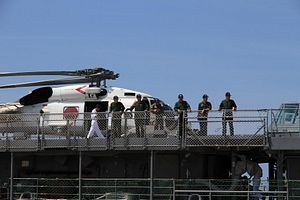Japanese Prime Minister Shinzo Abe’s government is requesting another record budget for 2017. This week, Japan’s defense ministry put in a request for 5.168 trillion yen (approximately $50 billion) to go toward the development of a new anti-ship missile, protecting against threats from North Korea, and bolstering island defense in the East China Sea, where Japan and China have a territorial dispute. The budget, if approved by the Japanese Diet, would represent a 2.3 increase in defense spending.
The 2017 budget will allow Tokyo to address the primary themes discussed in its annual defense white paper, the latest iteration of which was released in August 2016. Like in 2015, the Japanese Defense Ministry highlighted ongoing challenges from China in the East China Sea and discussed Beijing’s land reclamation activities in the South China Sea. This summer, in particular, has seen an acute uptick in tensions in the East China Sea as Beijing looks to draw attention away from the South China Sea after an unfavorable international legal verdict in a case filed by the Philippines in 2013.
As I’ve discussed extensively this summer (see here, here, and here), China’s navy and coast guard have been unusually provocative in the East China Sea. The Chinese People’s Liberation Army-Navy, for the first time ever, entered the contiguous waters of the disputed Senkaku/Diaoyu Islands in the East China Sea. More recently, armed Chinese coast guard vessels accompanied scores of Chinese fishing trawlers in disputed waters, in a repeat of similar incidents back in 2012 after Japan nationalized the Senkaku/Diaoyu Islands. . Amid these challenges, Tokyo’s 2017 defense budget request is unsurprisingly high.
Missile defense upgrades feature prominently in the 2017 budget request as well. This is unsurprising given the increased frequency of missile testing in the Sea of Japan by North Korea. A North Korean ballistic missile, for the first time ever, splashed down in Japan’s exclusive economic zone this summer, raising concerns in Tokyo. To this end, Japan is looking to put a significant portion of its 2017 budget (100 billion yen, or approximately $995 million) toward upgrading its advanced PAC-3 missile interceptors and pursuing co-development of advanced missile interceptors with the United States. Tokyo intends to fully upgrade the PAC-3 batteries defending the city before the 2020 Summer Olympics.
Additionally, while details remain sparse, Tokyo is looking to build missiles to deter additional Chinese provocations in the East China Sea. The proposed Japanese budget request features these missiles — both anti-ship and air-to-surface variants. Missile development, in addition to meeting a proximal deterrent need, would also help Japan’s defense industry mature as Abe looks to normalize Tokyo’s defense behavior. In 2011, under the previous Democratic Party of Japan-led government of Prime Minister Yoshihiko Noda, Japan ended its decades-long self-imposed ban on weapons exports.
As my colleague Franz-Stefan Gady discussed last year, Japan adopted a record budget in 2015 and has seen its defense budget rise for four consecutive fiscal years since Abe returned to office as prime minister in 2012. Last year’s increase accounted for the weakening of the Japanese yen as well, though the currency has since appreciated. Tokyo additionally accounted for its share of relocation costs for U.S. facilities in Okinawa and increasing personnel costs.

































